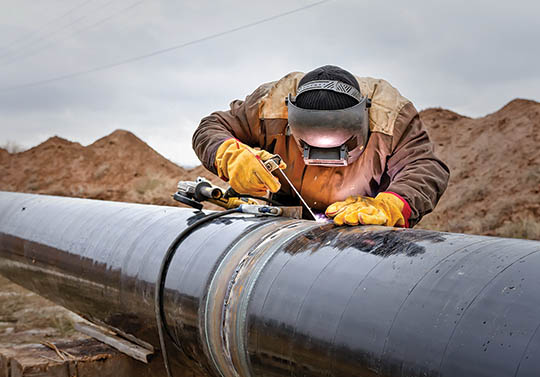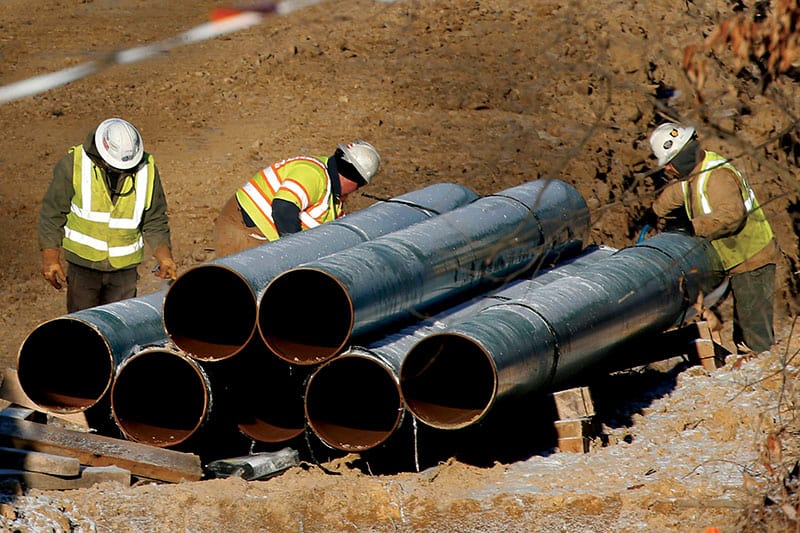Natural gas distribution is a great career choice for people who enjoy working outdoors and helping their communities. This career involves transporting natural gas from the wellhead to homes and businesses. Natural gas distribution workers are laying pipelines, maintaining them, and repairing them when necessary. They also monitor the flow of natural gas through these pipes and ensure that it meets quality and quantity regulations.
Is Natural gas distribution a good career path? The jobs in this industry offer good salaries and flexibility in how you work. If you’re considering a career in natural gas distribution and are looking for some advice, here’s what you should know:
- Natural gas distribution is not a 9 to 5 job. However, it may require travel, physical labour, and customer service. Although many jobs require these things, they can be especially demanding for natural gas distribution workers who spend their days on the road or working outside in all weather conditions.
- The pay is decent. However, the salary depends on factors such as level of qualification, job role, and experience. Top earners make up to $165,000 and more per year. The average salary of a Natural Gas Distribution worker is around $92,000.
What Is Natural Gas Distribution?
Natural gas distribution involves transporting natural gas from the source to the end user. Gas Distribution companies are responsible for ensuring that a city’s residents have access to this fuel, which is made up of methane. Natural gas is used in homes, businesses, vehicles, and other applications.
The industry is highly regulated, and companies must follow several safety standards. They must also ensure that the gas they distribute is safe and reliable. So this includes monitoring distribution lines as well as inspecting meters and pipelines. The natural gas industry is a major part of the U.S. economy and continues to grow yearly. The number of jobs in this field increased by 2.4% between 2017 to 2022, which means that there will be plenty of opportunities for those who want to enter this industry.
What Do Natural Gas Distribution Workers Do?

The job description for a natural gas distribution worker will vary depending on the position. Still, generally speaking, it’s your job to ensure that natural gas is delivered safely and efficiently to customers.
Natural gas distribution workers work in the field, in the office, and at the customer’s home or business. They use various tools and equipment such as compressors, meters, and measurement devices.
You may be working with other people who are responsible for installing or maintaining pipes that carry natural gas from the main pipeline to homes or businesses. You might also work alone without any direct supervision by supervisors since you are usually given specific tasks to complete on your own timeline.
5 Best Natural Gas Distribution Jobs
They are different jobs available in the Natural Gas Distribution industry. These jobs go from working in the field to the administrative side of Natural Gas Distribution. The job role of a worker is also crucial to how much money they make per year. This section will share some of the best career options in Natual Gas Distribution.
Drilling Supervisor
A drilling supervisor supervises the drilling operations and ensures that it is completed on time, safely, and within budget. The person in this role must have a good knowledge of geology, geological formations, and the equipment used in drilling operations. They must also communicate effectively with clients to ensure they are satisfied with the work.
The duties of a drilling supervisor include:
- Supervising the drill crew to ensure that they carry out their tasks correctly
- Monitoring progress of the project through reports from other team members
- Ensuring safety standards are met at all times.
Drilling supervisors earn about $186,000 per year.
Project Manager
A project manager is a person who manages a given project. They are responsible for ensuring that the product or service meets its goals on time and within budget. Project managers often have to think creatively to solve problems as they arise, especially when working with a team of people who may not all be thinking along the same lines.
To become one of these figures, you must have excellent communication and organizational skills. You must also understand how time works on large and small scales: what can take months or minutes; what takes hours, can take days, etcetera.
Project managers also make decent cash every year. They earn an average annual salary of $197,000.
Drilling
It is important to mention that drilling is an important part of the natural gas distribution process. Drilling rigs are used to make holes in the ground where wells will be drilled, which allows for the extraction of natural gas and oil.
The company that owns the drilling rig will drill the wells and then sell them to another company. To get started in this field, you must attend college or university before embarking on a career as a driller. In addition, a degree in mechanical engineering will give you a strong foundation in how machinery works, which is important when operating huge machines such as drillships capable of digging miles into the earth’s crust.
With this job role, you can make around $50,000 every year. As a driller, you will be in charge of operating machinery to extract oil and gas from the earth. Your job is to ensure that this machinery is working properly and that it doesn’t cause any harm to people or the environment. Therefore, you’ll need to have a thorough understanding of how machinery works and the ability to solve problems quickly and efficiently.
Reservoir Engineer
Reservoir engineers have an important role to play in oil extraction. They are in charge of predicting the quantity of oil and gas extractable from the ground. That means you will have to interpret data from seismic surveys, create a plan for drilling and completing wells, select appropriate equipment, manage contractors, and design production facilities.
You should also be able to interpret geological data and assess production options while keeping safety in mind.
A Reservoir engineer can make a whopping $172,000 per year.
Reservoir engineers must have extensive knowledge of petroleum engineering principles, including well construction methods and oilfield operations. They should also be able to use computer applications such as spreadsheets or databases daily.
Gas Technician
First, consider that natural gas distribution is highly technical and requires significant education and training. Most workers in this industry have a bachelor’s degree or higher.
For example, once you’ve completed all the necessary training requirements, you may be able to become a gas technician. As a gas technician, you’ll inspect and maintain pipelines and other equipment that deliver natural gas to homes and businesses across the country. You’ll also monitor air quality levels around pipelines to ensure they’re safe for nearby residents.
Gas Technicians make an annual average salary of $53,000.
How Are Working Conditions For Natural Gas Distribution Workers?

When you think about working in the gas industry, you might picture an office job behind a desk. However, natural gas distribution companies often focus on getting their product to customers quickly and efficiently. That means their workers must be on the road, using trucks and other vehicles.
Working conditions vary depending on your company, but generally, they can be pretty harsh for outdoor workers. You’ll be working outdoors in all weather conditions (heat waves in summer, freezing temperatures in winter), often with other team members by your side. In addition, you may have to move heavy equipment such as pipes or hoses frequently during your work day—and sometimes, these items can even weigh hundreds of pounds.
You’ll also likely be working with heavy machinery like backhoes and cranes while performing repairs or installations at remote locations where many other companies don’t provide service.
What Does The Future Hold For Natural Gas Distribution?
With a background in natural gas distribution, you’re not only equipped to handle the challenges of this industry but also ready to take on any other opportunities that come your way. As technology advances and industries become more integrated, there will be plenty of demand for trained professionals who can bring their unique skillset to bear on projects across multiple fields.
The future looks bright for those interested in working in natural gas distribution. The industry is expected to grow over the next decade as new infrastructure and systems are modernized. In addition, there will be increasing opportunities for collaboration with other sectors—including oil and gas extraction—as well as renewable energy sources like wind turbines or solar panels.
What Is The Educational Requirement In Natural Gas Distribution?
There are several different educational paths to becoming a natural gas distribution technician. The most common is an associate’s degree in science or engineering, but vocational training programs are available at technical schools and community colleges around the country.
Sometimes, employers prefer applicants with a bachelor’s degree over those without one. However, a diploma or postsecondary school certificate might be enough for entry-level jobs in this industry.
How Do You Get Into The Natural Gas Industry?
The natural gas industry is one of the most important industries in America, and it’s growing every year. If you’re interested in a career in this field, there are several options available to you.
You can learn the skills necessary for a welding or pipefitting position through an apprenticeship, but you also may be able to prepare by enrolling in a vocational school certificate or degree program.
If you’re interested in becoming a contractor, you’ll need to have experience working as an installer or technician with a natural gas utility company before being able to apply for your license as a contractor.
Wrapping Up
Natural gas distribution is a great career path for people looking to make a difference. It’s a job that helps you provide for your family and makes the world around us a better place. The future of natural gas distribution looks bright, with more jobs on the horizon as demand grows.
